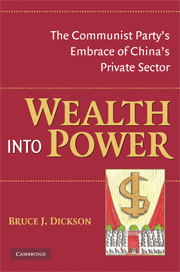Book contents
- Frontmatter
- Contents
- List of Tables and Figure
- Acknowledgments
- 1 Introduction
- 2 The Party's Promotion of the Private Sector
- 3 Co-opting the Capitalists
- 4 Bridges and Branches: The CCP's Institutional Links to the Private Sector
- 5 Views on the Economic, Political, and Social Environments
- 6 Private Entrepreneurs in Public Service: Participation in China's Formal Political Institutions
- 7 The Ripple Effects of Privatization: Corruption, Inequality, and Charity
- 8 Conclusion
- Appendix: Survey Design
- Bibliography
- Index
1 - Introduction
Published online by Cambridge University Press: 05 September 2012
- Frontmatter
- Contents
- List of Tables and Figure
- Acknowledgments
- 1 Introduction
- 2 The Party's Promotion of the Private Sector
- 3 Co-opting the Capitalists
- 4 Bridges and Branches: The CCP's Institutional Links to the Private Sector
- 5 Views on the Economic, Political, and Social Environments
- 6 Private Entrepreneurs in Public Service: Participation in China's Formal Political Institutions
- 7 The Ripple Effects of Privatization: Corruption, Inequality, and Charity
- 8 Conclusion
- Appendix: Survey Design
- Bibliography
- Index
Summary
After three decades of rapid economic growth in China, many observers believe that continued economic reform, and privatization in particular, is leading to eventual political change. China's economic reforms are creating the independent sources of wealth, power, and influence that scholars have shown to be key factors in a country's democratization. These economic and social changes have created expectations of a coming political change in China. Just as Chinese consumers have grown accustomed to freedom of choice in the market, they are also expected to begin demanding the right to choose their political leaders. China's growing numbers of private entrepreneurs and urban middle class are also expected to push for the increased transparency and accountability that democracy provides.
However, neither the Chinese Communist Party (CCP) nor China's capitalists have been willing to follow this script. Instead of engaging in conflict and confrontation, China's political and economic elites are increasingly intertwined, cooperating on producing national development and colluding in accumulating personal wealth. The CCP has not been a passive actor in the process of economic and social change but instead has taken steps to prevent organized demands for political change emanating from outside the party. In so doing, China has become a prime example of how authoritarian governments can employ strategic action to survive indefinitely despite rapid economic and social development. It has selectively accommodated some interests while suppressing others. In particular, it has limited the types of organizations that can exist, allowing the ones it feels can be beneficial to its policy agenda and suppressing those it deems a potential threat to its political power.
- Type
- Chapter
- Information
- Wealth into PowerThe Communist Party's Embrace of China's Private Sector, pp. 1 - 31Publisher: Cambridge University PressPrint publication year: 2008



